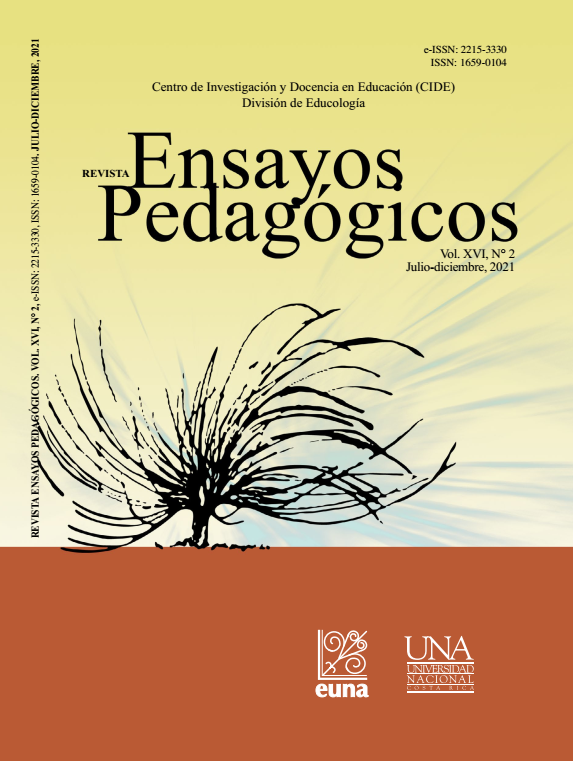Assessment of the Academic Conference as a Tool for Professional Development and Stregnthening of Language Teachers' Skills
DOI:
https://doi.org/10.15359/rep.16-2.11Keywords:
academic conference, professional development, program evaluationAbstract
Conferences possess an informative nature about the academic work that recognizes them as a regular practice within the professional academic arena. This type of activity that favors teachers’ professional development has become compulsory at the university level through time. In this way, academic conferences are an essential communicative-cognitive source for higher education. This study encompasses the evaluation of an academic conference by following principles of program evaluation. That valuation followed three approaches: program-oriented evaluation, decision-oriented evaluation, and participant-oriented evaluation. Although it impacts a project of a specific context, its results inform successful practices that might benefit similar initiatives. The dissemination of these data constitutes input to make thought-out and assertive decisions for the execution of effective and enriching academic conferences that would promote teachers’ professional development. It was concluded that the emancipatory role that the university grants to the individual through the spreading of knowledge is vital for the accompaniment of teachers of English inasmuch as their collective lens is strengthened so that greater social interaction is achieved. Collaborative networks, as constituted through academic conferences, promote feedback and humanization of teachers’ social relations who learn in collaboration with others.
References
Algren, M., Dwyer, E., Eggington, B. y Witt, B. (2011). So, you agreed to chair a conference! En C. Coombe, M. L. McClosky, L. S y J. Anderson (Eds.), Leadership in English Teaching and Learning (pp. 102-113). The University of Michigan.
Barrantes, L. y Olivares, G. (2017). Fortalecimiento del liderazgo pedagógico en docentes de inglés en servicio a través de Redes de Educación Continua (REEDUCO) Sede Regional Brunca. Revista Electrónica Gestión de la Educación, 7(1), 17-36. https://revistas.ucr.ac.cr/index.php/gestedu/article/view/27565
Calderón, R. y Mora, Y. (2015). Desarrollo profesional del docente de inglés en el área de evaluación de los aprendizajes. Revista Electrónica Actualidades Investigativas en Educación, 15(2), 1-22. https://doi.org/10.15517/aie.v15i2.18951
Chacón, C. T. (2010). Acento e identidad profesional en la formación del docente de inglés: Una perspectiva crítica. Paradigma, 31(2), 25-36.
Consejo Nacional de Rectores (CONARE). (2015). Plan Nacional de la Educación Superior Universitaria Estatal 2016-2020. OPES.
Fitzpatrick, J., Sanders, J. y Worthen, B. (2011). Program evaluation: Alternative approaches and practical guidelines. Pearson.
Galán, B. (2017). Estrategias de acompañamiento pedagógico para el desarrollo profesional docente. Revista Caribeña de Investigación Educativa, 1(1), 34-52.
Guba, E. G. y Lincoln, Y. S. (2005). Pragmatic controversies, contradictions, and emerging confluences. En N. Y. Denzin y Y. S. Lincoln (Eds.), The SAGE Handbook of Qualitative Research (pp. 191-215). Sage Publications.
Imbernón, F. y Canto, P. J. (2013). La formación y el desarrollo profesional del profesorado en España y Latinoamérica. Sinéctica Revista Electrónica de Educación, 41, 1-13. http://www.scielo.org.mx/scielo.php?script=sci_arttext&pid=S1665-109X2013000200010
Lincoln, Y. S., Lynham, S. A. y Guba, E. G. (2018). Pragmatic controversies, contradictions, and emerging confluences. Revisited. En N. Y. Denzin y Y. S. Lincoln (Eds.), The SAGE Handbook of Qualitative Research (pp. 97-150). Sage Publications.
Maturana, R. H. (1997). La realidad: ¿Objetiva o construida? Anthropos.UI.ITESO.
Mingorance, P. y Estebaranz, A. (2009). Construyendo la comunidad que aprende: La vinculación efectiva entre la escuela y la comunidad. Revista Fuentes, 9, 179-199.
Ruíz-Díaz, A., Roque-Doval, Y. y Rodríguez-Ruíz, M. (2017). Acciones de superación profesional para potenciar la competencia en comunicación de resultados científicos. Revista Electrónica Educare, 21(2), 1-23. https://doi.org/10.15359/ree.21-2.2
Sorokina, T. (2015). Género conferencial desde la semiótica compleja. Revista Iberoamericana de las Ciencias Sociales y Humanísticas, 4(8), 180-192. https://www.redalyc.org/articulo.oa?id=503950656011
Wolfram, W. y Schilling-Este, N. (2006). American English. Blackwell Publishing.
Published
How to Cite
Issue
Section
License
Ensayos Pedagógicos is subscribed to the Attribution-NonCommertial-NoDerivatives 4.0 International Creative Commons Licence, which allows both authors and readers to freely download, store, copy, and distribute the final approved publisehd version of the manuscript (post-print) as long as this is done without commercial purposes, no derivative works are generated, and the source and author are mentioned. As well, Ensayos Pedagógicos declares that authors will remain the rightful owners of the copyrights of their work in perpetuity.







